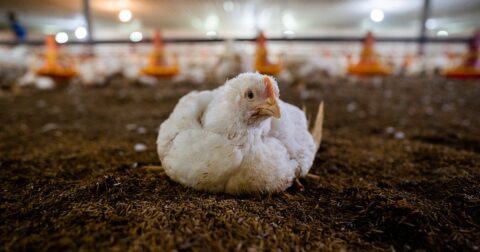Investigation
How Bacon for Breakfast Became an American Staple
Diet•6 min read
Perspective
Amid the fake beef culture wars, why does the "naturalness" of meat go unquestioned?

Perspective • Diet • Health

Words by Jessica Scott-Reid
The culture war pitting plant-based meat against its animal-based counterpart rages on, it seems. Plant-based alternatives are called “ultra-processed,” “fake” and “synthetic” — juxtaposed against factory farmed animal meat that’s touted as “all natural” and “single ingredient.” How did we get here?
One recent source of this conflict — and the subsequent backlash to plant-based meat — can be traced back to meat industry manipulation. A Super Bowl commercial and a New York Times ad, paid for by a public relations firm used by the meat industry, planted seeds of doubt about “scary” ingredients in plant-based meat back in 2020.
Sales of Beyond and Impossible burgers went on to plateau — for a number of reasons that food industry media continues to hash out. But even as the debate over “unnatural” and high-tech plant-based products persists, the assumed naturalness of animal products appears to be flying under the radar. It shouldn’t.
Those oft-invoked images of small family farms, rolling bucolic pastures and friendly neighborhood abattoirs are far from reality across most of today’s food system. More than 70 percent of the world’s meat comes from factory farms. The setting usually features massive windowless sheds and packed dusty lots run more by technology than humans — mechanized, production line-style slaughterhouses that use gas chambers and electricity to kill more animals per day than ever before. In other words, in most of the world, animal agriculture is anything but natural.
Of course, the entire point of modern farming is to harness natural resources to grow enough to feed humans, which is not a bad thing — but it’s far from a wild, all-natural ecosystem. Perhaps more productive than measuring which foods are “natural,” would be to measure how to best feed people humanely and justly while leaving actual nature alone as much as possible.
Consider just how many farm animals populate the globe today. The number of livestock farms across the western world has been in steady decline over the last fifty years. The number of animals, though, has drastically increased. The industry calls this efficiency, but many animal and environmental researchers see it as great cause for concern.
Sometimes called confined animal feeding operations (CAFOS), or industrialized or intensive farming, the predominant method of producing meat and dairy today involves packing large numbers of animals into confined spaces or onto barren lots — a far cry from their natural habitats. In these confined spaces, animals may be manipulated with light, deprived at times and over-stimulated at others and impeded from exhibiting many natural behaviors, even the simple act of turning around.
Animals farmed for food today are bred and genetically manipulated to possess more profitable traits, like accelerated growth and larger size, for instance. This results in farmed animals bearing very little resemblance to their wild ancestors, and who suffer from various ailments due to their unnatural physiology.

And despite increased promotion of grass-fed beef and regenerative grazing over the last few years, the vast majority of animals farmed for food in the global north are not out to pasture chowing on fresh foliage. About a third of all corn grown in the U.S. (the nation’s top crop), is used for animal feed while about 60 percent of all soybean meal produced in the US also goes to feeding farmed animals. On a global scale nearly 80 percent of the world’s soybeans go to animals farmed for food.
What’s more, there is often confusion about what grass-fed even means — it can actually include cattle who were fed grass (including farmed and harvested grasses) for only a portion of their lives. The bottom line — the arguments that a plant-based diet promotes mono-crops, GMOs and even mass death of small animals killed in crop harvesting is moot when you consider that most of the soy and corn grown today goes to farmed animal feed.
There is also nothing natural about the way animals are raised on industrial meat operations. In order to produce enough meat to satisfy a population of meat-eaters, pig farms, for example, often feed sows a hormone sourced from the blood of pregnant horses — entire horse blood farms exist just to extract blood from mares, in fact.
Chickens, pigs and cows are often fed antibiotics, hormones and even the same vitamin supplementation that plant-based eaters are chastised for: B12. These practices are designed to minimize the spread of disease in what are unsanitary and unnatural conditions — and as a consequence we are experiencing skyrocketing rates of antimicrobial resistance (AMR) among humans. The World Health Organization declared this one of the top 10 global public health threats to humanity in 2019, and the United Nations estimates it could kill as many as 10 million people annually by 2050.
If all this comes as a surprise, you’re not alone. Our collective perception of meat as natural is deeply rooted in our psyche, according to Melanie Joy, PhD, social psychologist and author of Why We Love Dogs, Eat Pigs, and Wear Cows: An Introduction to Carnism. The meat industry has long relied on the narrative that meat is normal, natural and necessary, she argues. Now, boosters for animal agriculture are doubling down on those efforts.
Ultimately, there is nothing natural about modern meat, dairy and eggs. Their environmental toll on nature is indisputable — wild ecosystems that are essential for keeping climate pollution and pandemics in check are being destroyed by industrial meat. It’s modern meat that’s the threat to nature, not plant-based burgers. Yet somehow, that’s not what we’re talking about.